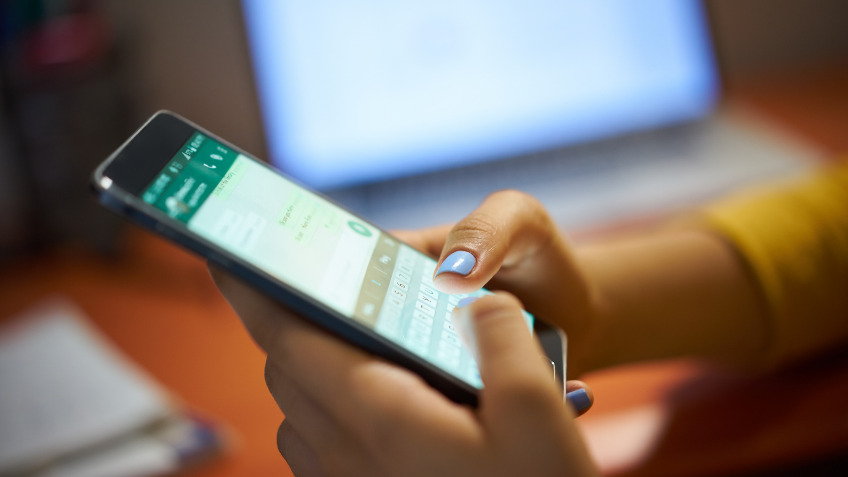NEWS AND INSIGHT
WhatsApp Changes Signal User Concern

If you are a WhatsApp user, you may have heard that Facebook, owner of the messaging app, will be asking users to agree to new privacy rules. The update, originally scheduled for 8th February 2021, has been delayed until 15th May , following a backlash by users who left and switched to rival messaging apps, Telegram and Signal.
Both of these alternative messaging apps offer end-to-end secure connections, but with less invasive privacy policies. Messaging app, Signal, has been creating quite a stir, with WhatsApp users choosing to migrate to Signal in the past few weeks.
WhatsApp responded with the change in date for the policy, but that does not seem to be impact the rate of new users for the Signal app, with such a high rate of new members causing Signal to have issues with their platform and infrastructure, with users reporting crashes.
There are fears that despite WhatsApp's commitment to user security, these new terms will reduce privacy and allow the parent company, Facebook, to start to use the data.
Do you use WhatsApp? No? Then move along, however if you DO use WhatsApp should you be worried about their new terms and conditions?
What's All the Fuss About?
Following the announcement of the change of their Terms of Service, WhatsApp had a pop up, informing you of the changes, which quite simply, you had to agree to in order to continue using the platform. We have not seen that pop up recently, but it appears that you will eventually need to agree to continue using their platform. The notification stated that if you failed to agree to the new terms, WhatsApp would delete your account, which can be revived if you accept the new Terms of Service.
WhatsApp's Director of Public Policy in Europe, Middle East and Africa, tweeted:
"It remains the case that WhatsApp does not share European Region WhatsApp user data with Facebook for the purpose of Facebook using this data to improve its products or ads,"
However, it has been pointed out that further changes to their user agreement may compromise that in future.
Why are WhatsApp's Terms of Service Changing?
WhatsApp is owned by Facebook, and these changes will offer increased interaction by businesses, and gather financial data from users. As WhatsApp is free to use, then YOU are the product, and your data is the product used to help Facebook profit from WhatsApp's billions of free user accounts.
WhatsApp already collects metadata related to your account, like:
- Your mobile phone number
- Your user profile picture
- Your usage patterns
- Features you use
- Groups you've joined
- Status in the Story format
- Device data - Android, OS, etc.
The update to WhatsApp brings with it a new section, "Transaction and Payments Data", this is probably the start of enabling WhatsApp to make payments, much like Apple Pay and PayPal to allow you to pay for goods and services both on and offline. Facebook has been late to the party when it comes to payment gateways and no doubt, they are keen to keep their users cash flowing through their systems.
What's So Bad About That?
Along with the possibility of a new payment gateway there are a few changes which might not be so great.
1) Their new policy says WhatsApp may send you marketing material about Facebook companies. You might not want that, but you cannot opt out if you are using WhatsApp.
2) Facebook will use your data, add it to any data it already holds about you and use this for:
- Content suggestions
- People recommendations
- Targeted ads
- Service/feature improvements
Facebook is already keen to track your activity when you are not on Facebook, unless you switch that off this may give them even more detailed consumer behaviour data to sell to businesses wanting to advertise.
Stated plainly, your data is up for sale by Facebook, and this new agreement will allow Facebook to use their advertising platform either directly within WhatsApp or use data gathered within WhatsApp to more effectively target you on their other platforms.
Facebook have stated this change will allow:
"integrations which enable you to connect your WhatsApp experiences with other Facebook Company Products."
You may want that integrated experience. However, the new terms have already been criticised by security and privacy experts for undermining the service's data protection credentials.
WhatsApp Business already lets merchants access users on the platform, and third-party apps might read your messages on behalf of a business you are communicating with on the app. This is likely to be extended with the new changes.
How Concerned Should You Be?
For the moment, any WhatsApp users in Europe and the UK will avoid the new privacy policy, for the time being. Facebook stated that the new data-sharing update mentioned in the new WhatsApp user terms will not apply to EU or UK users, replaced by a different policy lacking any new data-sharing terms.
However, Facebook will be updating their UK Terms of Service soon, to move away from the EU company, and will force users to accept the US terms of service, which could lead to lower data privacy for UK users. If privacy is a concern, then this will raise a lot of questions.
"There are no changes to WhatsApp's data-sharing practices in the European region arising from the updated terms of service and privacy policy. For the avoidance of any doubt, it is still the case that WhatsApp does not share European region WhatsApp user data with Facebook for the purpose of Facebook using this data to improve its products or advertisements," a Facebook spokeswoman commented recently.
One thing to note is that the "information" collected by WhatsApp is not your chats, since those are encrypted and can't be seen by WhatsApp or Facebook, even if it wanted to. The information they are collecting is, as we stated above, data , like your phone number, your contacts, any profile names and diagnostic details. That list is not comprehensive but gives you an idea of the data they will be looking for.
So, What Should I Do?
It seems the user agreement will change at some point to allow Facebook to get greater access to user data, or to pave the way to access data at a later date. However, it is always worth remembering that if the service is free, then you and your data are likely to be the way the company is making money.
What Are the Alternatives?
The two biggest alternatives that users have been migrating to are:
Telegram App - again, end-to-end encryption but there have been security concerns flagged by Edward Snowden, the infamous whistle-blower.
Signal Messenger App - as a similar product, this has seen a lot of new users migrating away from WhatsApp. Edward Snowden has stated publicly that he uses this app daily.
What is Signal Messenger App?
Wikipedia state that Signal Messenger App is:
"... a cross-platform centralized encrypted messaging service developed by the Signal Technology Foundation and Signal Messenger LLC. It uses the Internet to send one-to-one and group messages, which can include files, voice notes, images and videos. It can also be used to make one-to-one and group voice and video calls, and the Android version can optionally function as an SMS app."
Basically, it's going to offer the same functions as WhatsApp, without the Facebook data sharing. Elon Musk recently stated, "Use Signal" and whilst we would love to have him tweeting about us, he meant people should switch to this alternative messaging app. He was, of course, highlighting the issues we have outlined above and encouraging his followers to use Signal, as it has better security protocols that offer better protection than similar services.
In January, Signal stated their user base had gone from 10 million installs on the Google Play market to over 50 million downloads in just one day. This influx of new users flooded their servers, and the service suffered a few well-publicised outages.
Signal (@signalapp) in a tweet on January 14, 2021 stated:
"We have been adding new servers and extra capacity at a record pace every single day this week nonstop, but today exceeded even our most optimistic projections,"
Why is Signal Messenger App Better than WhatsApp?
Signal Messenger is free and can be installed from Android and Apple app stores. As well as extra security protocols, Signal includes basic messaging tools, read receipts, emoji support, group chats, and voice and video calls, it has functionality very similar to WhatsApp.
Signal offers user privacy with end-to-end encryption, which is powered by their open source "Signal Protocol". The company simply cannot read your messages or monitor your calls, and no one else can either. Signal also doesn't keep any user data, so your friendly neighbour surveillance service, other agencies, and people with malicious intent can't get to your data.
Open-source code means that anyone can look at Signal's code to see how it is built, but that doesn't mean it can be hacked. Whilst you can see how the code functions, the encryption takes place in real-time, and it makes Signal's encryption virtually uncrackable. However, allowing users to see their code means professional security experts can identify how it is constructed and check that Signal is indeed maintaining the high privacy standards it claims in its user agreement.
A lot of privacy experts, and security researchers have explored the code and given Signal's data security the green light. It's about as robust and secure as you can currently get.
Who Owns the Signal App?
The team running Signal has a lot of experience and the Executive Chairman of the Signal Foundation is Brian Acton, a cofounder of WhatsApp. Acton joined with another tech company, Marlinspike in early 2018, and created the Signal Foundation. This organisation is a non-profit, its mission to provide safe, private and secure communication that is "accessible and ubiquitous". Currently, Signal continues to keep its lights on solely through donations and may offer a premium paid option at some point. We can't say for sure, but they are not recording user data and therefore can never sell it, so are unlikely to move to an ad model for their revenue.
How Do You Install and Use Signal?
Exactly the same as WhatsApp, more or less. Install through your app store and then set up your account and user profile all in the app. If you have What's App, you'll be able to figure out Signal. On Android, you get the option to use the app as your default SMS messaging app for normal text messages.
The entire interface is very simple, straightforward and icon driven, you can even embed voice clips in messages just like WhatsApp.
OK, If I Ditch WhatsApp, What Should I Use?
The main points to note for each alternative app:
Signal
- Keeps all data on your device by default
- Encryption is more advanced than Telegram's
- Run by a non-profit
Telegram
- Keeps your data on its servers
- Slightly less advanced encryption
- Owned by Pavel Durov, Russian billionaire who runs a social media site
The choice is yours, but if you value privacy, do not want Facebook selling your data (and having ads targeting you) then you should switch. If it's a choice between Signal and Telegram, then we'd suggest taking a look at Signal and if you switch tell us, so we can add you!
This story is not over and is likely to rumble on, Apple's CEO Tim Cook recently forced Facebook to take out a full page advert defending itself and its user tracking.
Time Cook stated in a tweet:
"We believe users should have the choice over the data that is being collected about them and how it's used. Facebook can continue to track users across apps and websites as before, App Tracking Transparency in iOS 14 will just require that they ask for your permission first."
Facebook responded in typically bullish fashion:
"While limiting how personalised ads can be used does impact larger companies like us, these changes will be devastating to small businesses adding to the many challenges they face right now," said Facebook in its ad.
It is not entirely altruistic that Apple should add these security updates to iOS 14, as Apple is keen to keeps its user's cash for itself.
One thing is clear though, the privacy of users all over the world is going to be the next big battlefield for big tech. Gathering and using data to help build better business is something we should do, but not at the expense of the safety and security of our customers.
If you have any data concerns or want to speak to someone about your businesses data gathering, get in touch with SiGNAL (at Martinique House, Bordon not the app).
Whatever your business problem, get in touch and tell us how we can help. We can discuss what might be the best way forward and which one of our residents, BiZHUB members or many, many contacts, locally, regionally or nationally may be able to help you.







